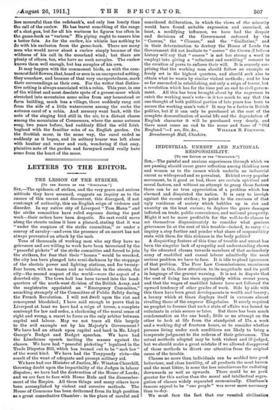LETTERS TO THE EDITOR.
THE LESSON OF THE STRIKES.
[To THE EDITOR OP THE "SPECTATOR.")
Sra,—The epidemic of strikes, and the very grave and serious attitude they have assumed, suggests an inquiry as to the causes of this unrest and discontent, this disregard, if not contempt of authority, this un-English reign of violence and disorder. In my native city of Liverpool " Tom Mann " and the strike committee have ruled supreme during the past week—their orders have been despotic. No cart could move along the streets unless it bore a placard, stating that it was "under the auspices of the strike committee," or under a convoy of cavalry—and even the presence of an escort has not always prevented an attack by the mob.
Tens of thousands of working men who say they have no grievance and are willing to work have been terrorized by the "peaceful pickets" of the strike committee and forced to join the strikers, for fear that their "houses " would be wrecked, the city has been plunged into semi-darkness by the stoppage of the electric power and lighting stations, and for twenty- four hours, with no trams and no vehicles in the streets, the city—the second seaport of the world—wore the aspect of a deserted city. The town hall has been turned into the head- quarters of the north-west division of the British Army, and the magistrates appointed an "Emergency Committee," smacking strangely of the Committee of Public Safety during the French Revolution. I will not dwell upon the riot and consequent bloodshed; I have said enough to prove that in Liverpool at least we have had a reign of terror, a complete contempt for law and order, a slackening of the moral sense of right and wrong, a resort to force as the only arbiter between capital and labour. May we not trace all this largely to the evil example set by his Majesty's Government We have had an attack upon capital and land in Mr. Lloyd George's Budget and Budget speeches. We have had the Limehouse speech inciting the masses against the classes. We have had "peaceful picketing" legalized in the Trade Disputes Bill, which has turned out to be " mob law " of the worst kind. We have had the Tonypandy riots—the result of the want of adequate and prompt military aid.
We have had our Minister of Justice, Mr. Winston Churchill, throwing doubt upon the impartiality of the Judges in labour disputes ; we have had the destruction of the House of Lords ; and we are face to face with Home Rule and the dismember- ment of the Empire. All these things and many others have been accomplished by violent and coercive methods. The House of Commons has been dethroned from its high position Oa a great consultative Chamber: in the place of careful and
considered deliberation, in which the views of the minority would have found suitable expression and exercised, at least, a modifying influence, we have bad the despair and decisions of the Government enforced by the " Caucus," the " Closure," and the " Guillotine," and in their determination to destroy the House of Lords the Government did not hesitate to " coerce " the Crown (I believe history will say that " coerce" is not too strong a word to employ) into giving a "reluctant and unwilling" consent to the creation of peers to enforce their will. It is scarcely sur- prising that the working man should follow an example so freely set in the highest quarters, and should seek also to obtain what he wants by similar violent methods ; and be has so far succeeded in establishing, not only a reign of terror, but a revolution which has for the time put an end to civil govern. ment. All this has been brought about by the eagerness to catch the working man's vote—is it too much to say that the one thought of both political parties of late years has been to secure the working man's vote P It may be a factor in British politics, but if it can only be purchased at the cost of the complete demoralization of social life and the degradation of English character it will be purchased very dearly, and there must come an end to the name and fame of " Old


































 Previous page
Previous page